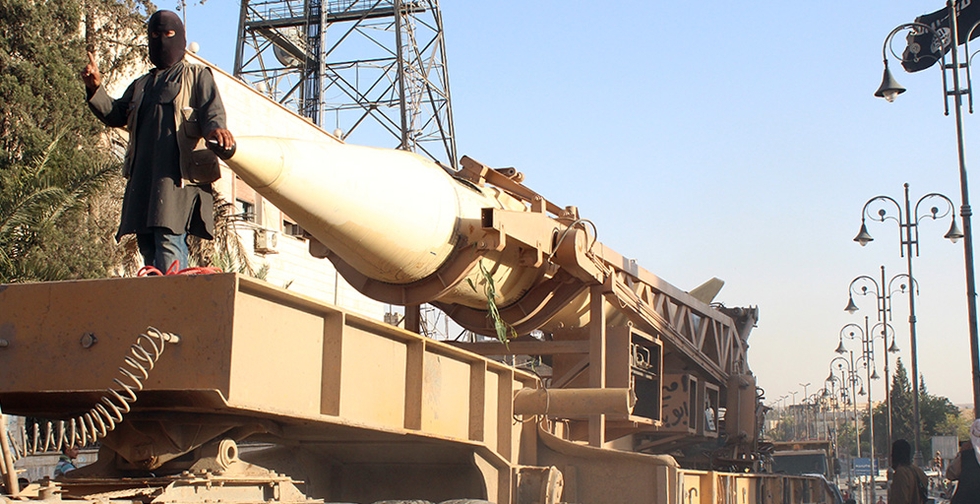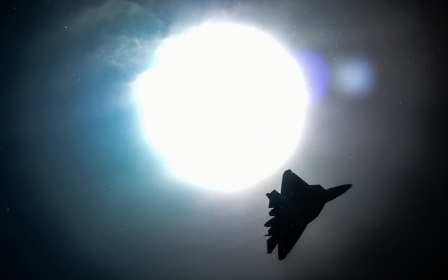Life in Raqqa: 'We are starving and face death from all sides'

Raqqa is a cruel prison, its people are slowly starving to death and more foreign bombs will only compound their misery, according to former residents who have fled to escape the Islamic State group.
In an interview with Middle East Eye on Monday, Abdullah K, who recently escaped to Europe, said that the city had fallen into the abyss, with its people facing the wrath of IS and foreign bombs.
His comments come as UK politicians prepare to vote on whether to extend the country's military action against IS into Syria. Raqqa, the group's de facto headquarters, will be a prime target.
The city is already under attack from the US, Russia and most recently France, which stepped up its campaign in the aftermath of IS attacks this month in Paris.
Speaking to Middle East Eye from the Greek-Macedonian border, Abdullah said Raqqa's population was on the brink of starvation.
"Today, Raqqa is a dark nightmare. IS strives in every way to starve the civilian population, and it is succeeding. There is barely any electricity. Water has not been sanitised since IS took over.
"The city’s centre resembles a ghost town. Only the houses that have been forcibly taken over by members of IS receive services.
"The cost of a bag of bread has reached unbelievable prices," Abdullah said. "Despite IS threatening to cut off the hand of whoever is caught, theft has become widespread and occurs in broad daylight precisely because of the starvation."
He said more bombing would only compound the misery.
"Any military intervention by the UK will not end the Assad gang, but will muddy the waters even further," he said.
"My message is not to the UK government but to its people: my countrymen have been slaughtered and displaced on the back of foreign countries settling scores with each other.
"I do not support any kind of intervention that does not reinstate stability and bring us back to our country, in addition to getting rid of Assad and IS."
He said that Russian and French sorties had completely failed to hurt IS.
"The Russian air strikes are like a blind man that is striking out everywhere except for the areas where IS are," he said. "The Russian strikes are raining down on civilians.
"The French air strikes are reactionary, random, and not calculated despite the fact that no civilians were killed and the strikes managed to target IS bases."
The black hole of Raqqa
Another former resident now based in Turkey told Middle East Eye of the danger of corresponding with anyone in Raqqa.
"There is no internet in homes, only in public cafes that are operated by IS," he said, requesting anonymity. "So it’s very risky not to mention nonsensical to speak out against them when they monitor everything."
Due to the IS stranglehold it is hard to confirm many details of life in the city, let alone hear the stories of bombardment from the perspective of civilians.
Life in Raqqa has been transformed since IS took over in January 2014, with the population falling from from a million to 400,000.
Punishment for those who do not observe its strict rules has become an everyday reality for residents.
Activists have been either executed or managed to escape to Turkey - by no means an easy feat considering that IS bans residents from leaving.
Reports have circulated of families of IS fighters fleeing Raqqa to Mosul in the wake of the recent air strikes. IS fighters have also moved into civilian areas to hide among civilians, and to use them as human shields.
Shashank Joshi, a senior research fellow at the Royal United Services Institute, says that while there is no doubt that air strikes are retaliatory, he does not believe that the coalition, especially France, is "playing into IS’s hands".
“I see no reason to believe that these air strikes were indiscriminate or unguided," he said. "Any serious state, particularly one like France that is very actively involved in Syria, and has a strong sense of pride and independence, is always going to react to incidents like this."
Joshi conceded it was difficult to get any information from Raqqa, which he described as a "black hole, primarily because of the way IS have kidnapped and murdered forces so frequently".
A different reality
It had looked so different in 2013 when the Free Syrian Army and the Ahrar al-Sham group pushed Syrian government forces from the city, and later the province. Under FSA rule, Abdullah said, life went on normally.
"Schools and colleges were open, and even government institutions remained running under the careful coordination between the FSA and Ahrar al-Sham," he said.
However, in the months before the declaration of the Islamic State in Syria and Iraq in the summer of 2014, many activists and well-known figures in Raqqa were kidnapped.
"There is no doubt that they were kidnapped by members of IS," he said. "These people - such as activists in the non-violent and armed movements, the head of the city’s council, the city’s board of trustees, and the legislative judge - were the driving force for uniting the street and organising large street protests."
On 10 January 2014, IS took over Raqqa. Schools were shut for a year and were reopened in February 2015, but only to the ninth grade. The entire curriculum was transformed from using “infidel” texts to books approved by IS.
According to one activist who fled Raqqa in October, most parents are afraid of the indoctrination and brainwashing their children will be subjected to at these schools and have opted to home-school them, which amounts to a death sentence.
IS, says the activist, vowed to kill teachers running private schools, particularly those for girls.
Failure to shut shops to join prayers are enough to earn storekeepers hefty fines or lashes. Women are forced to wear the full veil, plus another thick garment underneath.
Men are stopped at the many checkpoints manned by IS fighters and patrol guards and are sometimes ordered to hand over their mobile phones to see if they have songs or images of uncovered women saved.
But despite the daily horrors, those left have the hope that they will get through, said Abdullah: "My family is still in Raqqa, steadfast and waiting for relief."
Stay informed with MEE's newsletters
Sign up to get the latest alerts, insights and analysis, starting with Turkey Unpacked
Middle East Eye delivers independent and unrivalled coverage and analysis of the Middle East, North Africa and beyond. To learn more about republishing this content and the associated fees, please fill out this form. More about MEE can be found here.




